Participatory Village Land Use Planning in Tanzania
16 June 2023
Project Name
Reversing Land Degradation trends and increasing Food Security in degraded ecosystems of semi-arid areas of central Tanzania (LDFS)
GEF Implementing Agency
IFAD
Objective
To reverse land degradation trends in central Tanzania and Pemba (Zanzibar) through sustainable land and water management and ecosystem-based adaptation.
Project Targets
land under integrated and sustainable management
GHG emissions avoided or reduced
beneficiary households
Tanzania is home to nearly 600 terrestrial species that are classified as vulnerable, of which 291 are endangered and 91 critically endangered. However, land degradation, agricultural expansion, fires and unsustainable land use practices have resulted in significant degradation of flora and fauna, as well as the destruction and degradation of land for agriculture and livestock. Consequently, productive land is becoming increasingly scarce.
Climate change is leading to prolonged dry spells, increasing temperatures, and decreasing total annual rainfall. Farmers are also reporting a delayed onset and increased intensity of the wet season. The unpredictability of rainfall has caused an increase in crop failure due to poor seed germination and seeds and crops being washed away. Similarly, livestock pastures are decreasing in size and the risk of parasites and diseases is increasing.
The RFS Tanzania project supports farmers in 22 villages located in the Kondoa, Mkalama, Nzega and Magu areas in mainland Tanzania and the Micheweni area in Zanzibar (Pemba Island). These project sites are located in two of the country’s main biomes, the humid Miombo ecosystem and the Rift Valley Highland ecosystem, each with unique natural resources and biodiversity.
The project is structured around three principal components:
The project aims to meet the following targets:
Capacity of customary, village and district institutions developed in Natural Resource Management and joint village land-use planning.
Sustainability of ecosystem services and food and nutrition security supported in five focus areas.
Monitor and assess progress related to sustaining ecosystem services.
The project is coordinated by the Vice President's Office (VPO) Division of Environment. Major stakeholders of the project include the District Executive Directors of respective project districts; Ministry of Agriculture, Livestock and Fisheries (MALF); Ministry of Water and Irrigation; Ministry of Natural Resources and Tourism; Prime Minister's Office Regional Administration and Local Government; Ministry of Finance and Planning; and the National Land Use Planning Commission.
Each RFS country project conducts activities that fall under common thematic areas within the programme. Explore each project theme relevant to the RFS Tanzania country project below to see which activities are being implemented under each theme.
Stories from the Field
Explore our stories from the field to learn more about the activities, milestones, lessons learned, and achievements of the RFS Tanzania project.
Relevant Resources
We have a growing library of reports, briefs, case studies, media, tools and guidelines. Explore all resources related to the RFS Tanzania project to get greater insight into our programme activities.
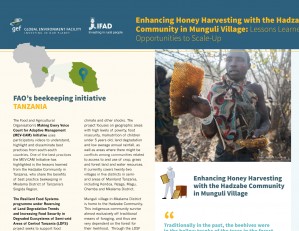
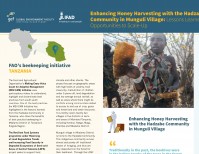
The Food and Agricultural Organisation’s Making Every Voice Count for Adaptive Management (MEV-CAM) Initiative uses participatory videos to understand, highlight and disseminate best practices from south-south countries. One of the best practices the MEV-CAM Initiative has highlighted is the lessons learned from the Hadzabe Community in Tanzania, who share the benefits of best practice beekeeping in the Mkalama District of Tanzania’s Singida Region.
The Resilient Food Systems programme under the Reversing of Land Degradation Trends and Increasing Food Security in Degraded Ecosystems of Semi-arid Areas of Central Tanzania (LDFS) project seeks to support food production and security in Tanzania. Through the LDSF project, the Hadzabe community have developed a land use and participatory plan of the forest.
This poster presents lessons learned and the process of adopting this best practice beekeeping from the Hadzabe community.
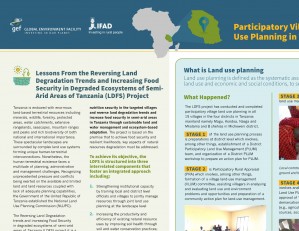
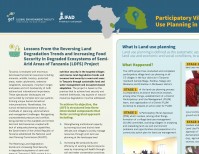
The Reversing Land Degradation trends and increasing Food Security in degraded ecosystems of semi-arid areas of Tanzania (LDFS) project is a pilot programme that will contribute to national, regional and global agendas. The Government of the United Republic of Tanzania facilitated an initiative that engages local people in creating participatory land use plans that reflect their contexts and needs. The RFS Tanzania project is piloting this approach on the ground in communities, and this poster presents emerging lessons from the project.
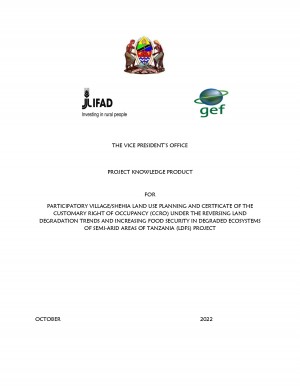
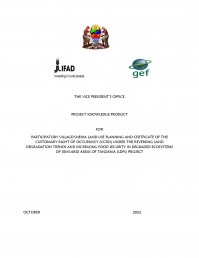
The Reversing Land Degradation Trends and Increasing Food Security in Degraded Ecosystems of Semi-arid Areas of Tanzania (LDFS) Project has conducted and completed participatory village land use planning in four districts in Tanzania.
This document highlights the approach, successes and lessons learned during this participatory activity.